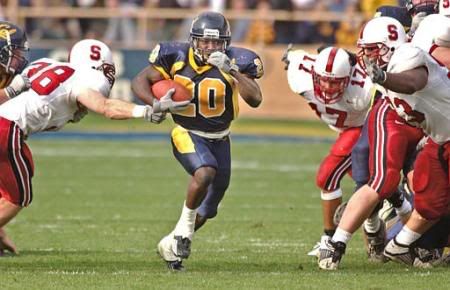Intimidating Venues, take 1
Most people claim that home-field advantage scores out at about 3 points per contest. That is, just by donning your colored jerseys, you claim a field goal on the visiting team. This is of course because for most schools, the visitors get an allotment of about 5% of the tickets available. In a stadium the size of the Big House (Michigan), this is 5,400 tickets. That's not many, when the other 102,600 fans are rooting for the other guys.
There are other reasons why playing out of town is tougher: the travel time, the lack of familiarity with the stadium, sometimes the time change or the altitude or the weather; when Cal played Air Force last September, the players hadn't realized that their helmets would expand, because of the thinner altitude. Tedford traveled up to Tahoe a few weeks before the game to hold some practices, to get the players acclimated to the idea. When Cal played Southern Mississippi, the game was originally scheduled for daytime in September, a much different prospect from December at night, when the game was finally played. Some people attribute the weather to the overwhelming advantage The Swamp (Florida) or Death Valley (LSU) give their teams.
But mostly it's all about the screaming fans who want blood. And since most stadiums allow the sale of alcohol, the home town fans really want blood.
Last year at the Coliseum, in LA, there were 84,000 USC fans in red screaming every time Aaron Rodgers went under center, and 8,000 Cal fans whispering whenever Matt Leinart took his turn on the field.
But it's not simply sheer numbers that can provide a substantial advantage. It's the noise those numbers make. Sounds travels better at night (this is physics), so when LSU plays in Death Valley at night, those Tiger fans sound a lot louder than they would during the day. [It's also cooler, so everyone has more energy.] Autzen, in Eugene, is tiny (55,000), but those Duck fans make the place rock.
This got to be a problem last year (and the year before, and forever since I can remember) at Memorial, because it's silent. We're used to being awful, and we're used to having no fans, and we're not used to cheering. Tedford and Rodgers both made appeals to the fan base to actually give Cal some home field advantage, and get in the game, but have no idea if it will work.
Texas A&M has a long-standing tradition of having the stands provide a 12th man, with organized and football intelligent cheering. It hasn't made altogether a difference in A&M's fortunes on the field, but that may have more to do with Oklahoma, Nebraska, and Texas than A&M's 12th man. The Packers (switching abruptly to the NFL) have a well-deserved reputation for being intelligent and loud; it helps that the Packers play in an outdoor stadium in Wisconsin, where weather is a factor. The Gators have smart fans, too.
But this isn't all of it, because on neutral fields where the fans are split more or less evenly (Jacksonville for the Florida-Georgia game, for instance, or back when the Iron Bowl was played at Legion Field in Birmingham), the home team still has an advantage.
Maybe it's just intimidating to not feel like you're at home.


0 Comments:
Post a Comment
<< Home